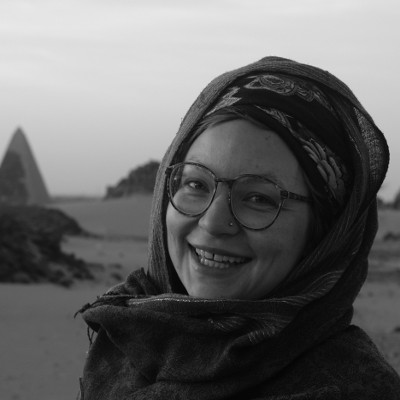B03
Register variation and asymmetric communication in Ancient Egypt
B03 untersucht die Entstehung und Entwicklung von Registerwissen im Altägyptischen (Afroasiatisch; ca. 3200 v. Chr. – 1200 n. Chr.). Auf Grundlage von Ergebnissen aus Phase I fokussiert sich das Projekt nun auf sozial asymmetrische Kommunikationssituationen und behält gleichzeitig den Forschungsansatz der zwei sich komplementär ergänzenden Perspektiven der korpus-basierten und der einzeltext-basierten Analyse bei. Im Zentrum stehen administrative, edukative sowie religiöse Texte und komplexe Text-Bild-Kompositionen. Basierend auf dem Field-Tenor-Mode Modell der Systemic Functional Linguistics und Erkenntnissen der Multimodalitätsforschung zielt das Projekt darauf ab, ein Modell der Registervariation im Alten Ägypten zu entwickeln.
Mitarbeiter*innen
Leitung
Mitarbeiter*innen
Studentische Hilfskräfte
Kooperationspartner*innen
Dr. Daniel A. Werning
AV Wortschatz der ägyptischen Sprache
Berlin-brandenburgische Akademie der Wissenschaften
Ehemalige Mitarbeiter*innen
Kontakt
Projekt in Förderphase I
Titel in Phase I
Register knowledge in Ancient Egypt
Beschreibung für Phase I
B03 untersucht die Entstehung und Veränderung von Registern im Alten Ägypten. Mit qualitativen und quantitativen Korpusstudien werden zunächst registersensitive (morphosyntaktische) Variablen identifiziert und dann deren Verteilung ermittelt. Dabei soll sowohl die Registerunterscheidung bei bestimmten einzelnen Autoren (echte intraindividuelle Variation) als auch die Registerkonstitution durch Gruppen von Autoren untersucht werden.
Veröffentlichungen und Präsentationen
Kutscher, Silvia (2025) Space as a Semiotic Resource in Stationary Graphic Communication of Ancient Egypt: A Theoretical Outlook In: Spaces and Meaning: Multimodality in Ancient Egypt [ViVo] Serova, Dina; Kutscher, Silvia (2025) Spaces and Meaning: Introduction to the Volume In: Spaces and Meaning: Multimodality in Ancient Egypt [ViVo] Serova, Dina (2025) Social Cohesion and the Use of Space: A Miniature Chapel from the Late Middle Kingdom In: Spaces and Meaning: Multimodality in Ancient Egypt [ViVo] Serova, Dina (2024) Problematizing linguistic variation in the Coffin Texts: A case-study on spell CT 335 In: Variability in the Earlier Egyptian Mortuary Texts and related materials [DOI] [ViVo] Register choices in Ancient Egyptian mortuary texts have not been studied so far and are a promising research area. This article tentatively explores the option of understanding instances of linguistic variation observed in Coffin Texts as diaphasic rather than as diatopic or diastratic choices. This is undertaken on the basis of spell CT 335 by keeping the temporal and spatial parameters as stable as possible. In considering only examples of this text originating from Middle Kingdom Thebes, variational parameters and situational-functional factors of two text pairs of this Coffin Text spell, namely T1Ca and T1Cb as well as T1Be and T2Be, are investigated in a case-study.Serova, Dina; Hutter, K. (2023) "Erzählte Räume" in nicht-narrativen Texten: Der Schauplatz als Erzählkategorie am Beispiel von PT 412 In: Narrative and narrativity in ancient Egypt: Case studies on narrative difference in various media [DOI] [ViVo] Pescuma, Valentina Nicole; Serova, Dina; Lukassek, Julia; Sauermann, Antje; Schäfer, Roland; Adli, Aria; Bildhauer, Felix; Egg, Markus; Hülk, Kristina; Ito, Aine; Jannedy, Stefanie; Kordoni, Valia; Kühnast, Milena; Kutscher, Silvia; Lange, Robert; Lehmann, Nico; Liu, Mingya; Lütke, Beate; Maquate, Katja; Mooshammer, Christine; Mortezapour, Vahid; Müller, Stefan; Norde, Muriel; Pankratz, Elizabeth; Patarroyo, Angela Giovanna; Plesca, Ana-Maria; Ronderos, Camilo R.; Rotter, Stephanie; Sauerland, Uli; Schulte, Britta; Schüppenhauer, Gediminas; Sell, Bianca Maria; Solt, Stephanie; Terada, Megumi; Tsiapou, Dimitra; Verhoeven, Elisabeth; Weirich, Melanie; Wiese, Heike; Zaruba, Kathy; Zeige, Lars Erik; Lüdeling, Anke; Knoeferle, Pia; Schnelle, Gohar (2023) Situating language register across the ages, languages, modalities, and cultural aspects: Evidence from complementary methods In: Frontiers in Psychology [DOI] [ViVo] In the present review paper by members of the collaborative research center ‘Register: Language Users’ Knowledge of SituationalFunctional Variation’ (CRC 1412), we assess the pervasiveness of register phenomena across different time periods, languages, modalities, and cultures. We define ‘register’ as recurring variation in language use depending on the function of language and on the social situation. Informed by rich data, we aim to better understand and model the knowledge involved in situation- and function-based use of language register. In order to achieve this goal, we are using complementary methods and measures. In the review, we start by clarifying the concept of ‘register’, by reviewing the state of the art, and by setting out our methods and modeling goals. Against this background, we discuss three key challenges, two at the methodological level and one at the theoretical level: 1. To better uncover registers in text and spoken corpora, we propose changes to established analytical approaches. 2. To tease apart between-subject variability from the linguistic variability at issue (intra-individual situation based register variability), we use within-subject designs and the modeling of individuals’ social, language, and educational background. 3. We highlight a gap in cognitive modeling, viz. modeling the mental representations of register (processing), and present our first attempts at filling this gap. We argue that the targeted use of multiple complementary methods and measures supports investigating the pervasiveness of register phenomena and yields comprehensive insights into the cross-methodological robustness of register-related language variability. These comprehensive insights in turn provide a solid foundation for associated cognitive modeling.Lehmann, Nico; Serova, Dina; Lukassek, Julia; Döring, Sophia; Goymann, Frank; Lüdeling, Anke; Akbari, Roodabeh (2023) Guidelines for the annotation of parameters of narration. In: REALIS: Register Aspects of Language in Situation [DOI] [ViVo] The present guidelines describe the annotation of narrative phenomena on the clause level, using a combination of ideas and methods from linguistics and lit- erary studies. The main categories marking the discourse strategy “narration” in stretches of text have been narrowed down to mediacy, i. e. involving a narrator, and sequentiality of events. This document specifies how to define mediacy, and in turn determine whether a narrator is present, as well as how to identify events and their sequential ordering. Lastly, a functional layer annotation is proposed which allows researchers to compare different types of narrative instances. This offers a basis for investigating a potential narrative register which is said to be important for many kinds of register studies.Kammerzell, Frank (2022) Adapter l'écriture à l'évolution linguistique In: Guide des écritures de l'Égypte ancienne [ViVo] Kammerzell, Frank (2021) Reading multimodal compositions from Early Dynastic Egypt (with an appendix on previously unlisted, reinterpreted or otherwise noteworthy signs) In: Keep Out! Early Dynastic and Old Kingdom Cylinder Seals and Sealings in Context [ViVo] Kutscher, Silvia (2020) Multimodale graphische Kommunikation im pharaonischen Ägypten: Entwurf einer Analysemethode In: Lingua Aegyptia - Journal of Egyptian Language Studies [DOI] [ViVo] Lüdeling, Anke; Alexiadou, Artemis; Adli, Aria; Donhauser, Karin; Dreyer, Malte; Egg, Markus; Feulner, Anna Helene; Gagarina, Natalia; Hock, Wolfgang; Jannedy, Stefanie; Kammerzell, Frank; Knoeferle, Pia; Krause, Thomas; Krifka, Manfred; Kutscher, Silvia; Lütke, Beate; McFadden, Thomas; Meyer, Roland; Mooshammer, Christine; Müller, Stefan; Maquate, Katja; Norde, Muriel; Sauerland, Uli; Szucsich, Luka; Verhoeven, Elisabeth; Waltereit, Richard; Wolfsgruber, Anne; Zeige, Lars Erik (2020) Register: Language Users’ Knowledge of Situational-Functional Variation In: REALIS: Register Aspects of Language in Situation [DOI] [ViVo] The Collaborative Research Center 1412 “Register: Language Users’ Knowledge of Situational-Functional Variation” (CRC 1412) investigates the role of register in language, focusing in particular on what constitutes a language user’s register knowledge and which situational-functional factors determine a user’s choices. The following paper is an extract from the frame text of the proposal for the CRC 1412, which was submitted to the Deutsche Forschungsgemeinschaft in 2019, followed by a successful onsite evaluation that took place in 2019. The CRC 1412 then started its work on January 1, 2020. The theoretical part of the frame text gives an extensive overview of the theoretical and empirical perspectives on register knowledge from the viewpoint of 2019. Due to the high collaborative effort of all PIs involved, the frame text is unique in its scope on register research, encompassing register-relevant aspects from variationist approaches, psycholinguistics, grammatical theory, acquisition theory, historical linguistics, phonology, phonetics, typology, corpus linguistics, and computational linguistics, as well as qualitative and quantitative modeling. Although our positions and hypotheses since its submission have developed further, the frame text is still a vital resource as a compilation of state-of-the-art register research and a documentation of the start of the CRC 1412. The theoretical part without administrative components therefore presents an ideal starter publication to kick off the CRC’s publication series REALIS. For an overview of the projects and more information on the CRC, see https://sfb1412.hu-berlin.de/.Kutscher, Silvia; Döhl, Rebecca; Loebel, J.-M. (2020) CaeMmCom - Corpus altaegyptischer multimodaler Communication. Der Aufbau einer multimodalen Datensammlung altägyptischer Kommunikate In: Zeitschrift für digitale Geisteswissenschaften [DOI] [ViVo] Lincke, Eliese-Sophia; Paul, Tobias B. (2025) Lexical Diversity in the Thesaurus Linguae Aegyptiae: Evaluating Corpus-Linguistic Metrics for Ancient Egyptian Texts In: Bytes and Bygones - Digital and Computational Analyses of Ancient Cultures [ViVo] Serova, Dina (2024) The miniature chapel Vienna ÄS 186 as a case study for multimodality research In: CENTRAL Joint Workshop: Mosaics of Details. From Little Pieces to the Big Picture within an Interdisciplinary Framework [ViVo] Harel, Haleli; Serova, Dina (2024) Towards an agent-based situational model of language use: Expressing commands and prohibitions in Late Egyptian narratives In: ASOR Annual Meeting [ViVo] Riedel, Alexandra; Hülk, Kristina (2023) Abgrenzen und Einladen - Funktionale Gestaltungsaspekte der königlichen Pyramidenfriedhöfe in Meroe, Sudan In: Tagung des Forschungsclusters "Religion-Gesellschaft-Individuum" des Deutschen Archäologischen Instituts zum Thema "Kontrolle Sakraler und Sepulkraler Räume", Athen [ViVo] Serova, Dina (2023) Linguistic choices in dialogue representations in funerary texts: A case study on BD 78 In: ICE XII, International Congress of Egyptology [ViVo] Schnelle, Gohar; Serova, Dina (2023) Poster session of the participants of the Berlin University Alliance X-Student Research Group ‘Berlin epitaphs as source for historical register research’ In: Kolloquium SFB1412 (2023) [ViVo] The participants of the Berlin University Alliance X-Student Research Group ‘Berlin epitaphs as source for historical register research‘ present their results during a poster session. Their will be an introductory summary of the addressed research questions in English, the posters are prepared in German. organized by Gohar Schnelle and Dina Serova Our students will present their research results featuring the following topics: “Todesreferenzen in Grabinschriften des 17. Jahrhunderts” Franziska Groth, Stephanie Jandt “Darstellung stereotyper Putten im Hauptschiff der Berliner Marienkirche” Tom Liese “Orte und Mobilität auf Epitaphien des 17. Jahrhunderts der Berliner Marienkirche” Marthe Küster “V1 als Registermerkmal?” Elisabeth Eberle “Außertheologische Poesie auf Epitaphien” Luise Bensmann “Vergänglichkeit im 17. Jahrhundert am Beispiel von Epitaphien in der St. Marienkirche zu Berlin” Yasmin Altmann “Gedächtnis und Emotion. Die Rolle von Emotionen im barocken Totengedenken.” Clara Skrippek “Multimodalität und Rezeptionsbedingungen” Ladina Soubeyrand “Epitaphe als biographische Quelle” Svenja Kautz “Personenattribution auf Grabinschriften” Lola Hajnal Berg “Biographische Informationen auf Doppelepitaphien” Bastian IlgnerLehmann, Nico; Lukassek, Julia; Serova, Dina; Döring, Sophia (2022) On Narration In: CRC 1412 – Spring Retreat 2022 [ViVo] Hülk, Kristina (2022) Eine Betrachtung der Pyramidenkapelle Beg. N11 aus verschiedenen Blickwinkeln, Blick als semiotische Ressource In: Arbeitskreis Multimodalität im Alten Ägypten und Sudan, Humboldt-Universität zu Berlin, Berlin [ViVo] Hülk, Kristina (2022) Graphic Communication in Egypt and Sudan In: CRC 1412 - Fall Retreat 2022 [ViVo] Hülk, Kristina (2022) Frontality in Meroitic Visual Communication: Function and Variation in Meaning In: 15th International Conference for Nubian Studies, Warsaw [ViVo] Hülk, Kristina (2022) Project B03 - Resources In: Members' Meeting February 2022 [ViVo] Serova, Dina; Hülk, Kristina (2022) Introduction to Workshop ReAL "Register in Ancient Languages" In: ReAL " Register in Ancient Languages" [ViVo] Serova, Dina; Hülk, Kristina (2022) Register in Ancient Languages (ReAL) In: ReAL " Register in Ancient Languages" [ViVo] Serova, Dina; Lehmann, Nico (2022) Register Aspects of Language in Situation (REALIS) In: CRC 1412 - Fall Retreat 2022 [ViVo] Serova, Dina; Lukassek, Julia; Schulte, Britta (2022) Introduction to Workshop Narration in Context In: Narration in Context [ViVo] Serova, Dina (2022) 'Erzählte Räume' und Interaktion In: Arbeitskreis Multimodalität im Alten Ägypten und Sudan, Humboldt-Universität zu Berlin, Berlin [ViVo] Serova, Dina (2022) Semantic Perspectives on the Nude/Naked Body in Ancient Egyptian Texts In: Egyptology in dialogue: Historical bodies in relations of comparisons and negotiations, Emory University, zoom [ViVo] Serova, Dina (2022) Deformiert und diffamiert. Körperstrafen in Grabdarstellungen des Alten Reiches In: Jahrestagung des Clusters "Körper und Tod", DAI Berlin [ViVo] Serova, Dina (2022) Register variation in Ancient Egyptian narrative texts: A case-study on 'Wenamun' In: Current Research in Egyptology, Montpellier [ViVo] Serova, Dina (2022) Area B on modeling of register knowledge in Historical Linguistics In: CRC 1412 – Spring Retreat 2022 [ViVo] Serova, Dina (2022) Problematizing linguistic variation in the Coffin Texts: A case-study on spell CT 335 In: MORTEXVAR - Individuals, Groups, Tracers, Universidad de Alcala, zoom [ViVo] Döring, Sophia; Lehmann, Nico; Serova, Dina (2022) Narration In: CRC 1412 - Fall Retreat 2022 [ViVo] Kühnast, Milena; Serova, Dina (2022) Formality In: CRC 1412 - Fall Retreat 2022 [ViVo] Rickert, Alexa; Matić, Uroš; Serova, Dina (2022) Bodies in Ancient Egypt: Subjects, Objects, Media - Introduction In: Bodies in Ancient Egypt: Subjects, Objects, Media, WWU Münster [ViVo] Serova, Dina (2021) Pain and punishment. New Perspectives on Selected Iconographic Motifs in Old Kingdom Tomb Decoration In: Ninth European Conference of Egyptologists (ECE IX), Triest, zoom [ViVo] Serova, Dina (2021) Klassifikatoren in Bewegung. Eine Fallstudie zum Verb kfi/kfA 'entblößen; offenbaren; vertreiben; berauben; öffnen' In: 16. Internationaler Kongress der Deutschen Gesellschaft für Semiotik (DGS): "Transformationen: Zeichen und ihre Obkjekte im Wandel", zoom [ViVo] Serova, Dina (2020) Tracing down register variation in the 'Journey of Wenamun' In: SFB 1412 Klausurtagung, Humboldt-Universität zu Berlin [ViVo]







